- Handling Your Child's Dental Emergency
- Tooth Decay in Baby Teeth
- Your Child's Teeth
- Healthy Smiles for Mother and Baby
- Baby Teeth: When They Come In, When They Fall Out
- Your Child's First Visit to the Dentist
- Why Baby Teeth Are Important
- Your Child's Teeth: Ages Six–12
- Your Child's Teeth: From Birth to Age Six
- Your Child's First Dental Visit
Caring for Baby Teeth: Why Early Oral Health Matters
Did you know that baby teeth are vulnerable to cavities? Tooth decay can begin even before your child turns one, posing a threat to their oral health. Caused by harmful bacteria, tooth decay can break down the enamel—the protective outer layer of the teeth. When your child consumes food or drinks containing sugars, bacteria in their mouth produce acids that damage their teeth, potentially leading to cavities.
The acid can attack their teeth every time your child eats for 20 minutes or more. Over time, these acid attacks can weaken the enamel, resulting in tooth decay and eventually forming a cavity. Cavities can be painful; if left untreated, the decay may spread and cause infections in the baby's teeth.
The Importance of Baby Teeth
Baby teeth play a crucial role in the overall development of your child's oral health. They help your child chew and speak properly and act as placeholders for adult teeth. If a baby tooth is lost too early due to decay or damage, neighboring teeth may shift into the space. This can cause alignment problems when adult teeth emerge, potentially leading to crowded or crooked teeth. Misaligned teeth can be more challenging to clean, increasing the risk of further decay. Healthy baby teeth contribute to the likelihood of healthy adult teeth, so maintaining good oral hygiene is critical.
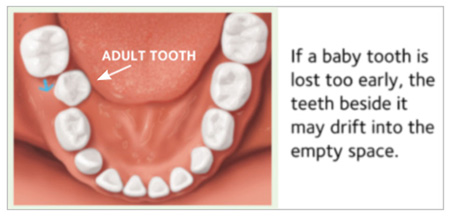
Building Confidence Through a Healthy Smile
Tooth decay doesn't just affect your child's physical health—it can also impact their emotional well-being. A smile marred by cavities or crooked teeth can lead to feelings of embarrassment, affecting your child's self-esteem. A clean, healthy smile can boost your child's confidence, especially in social settings like school. It's essential to prevent decay early on to give your child the best chance for a positive self-image and a healthy future.
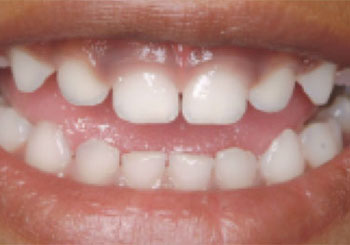
Healthy baby teeth
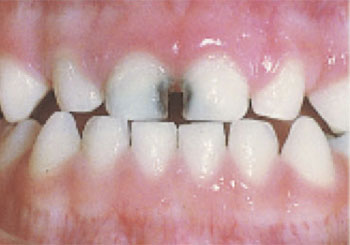
Moderate decay
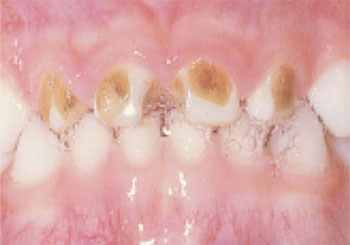
Moderate to severe decay
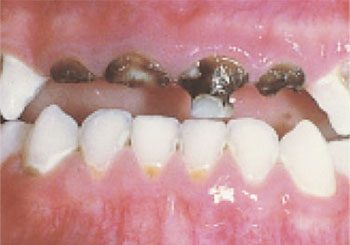
Severe decay
Establishing Good Oral Habits Early
One of the most important things parents can do is instill healthy dental habits at a young age. Start by gently cleaning your baby's gums with a damp cloth to remove food particles after feeding. Once your baby's first tooth appears, usually around six months of age, begin brushing twice a day using a soft-bristled toothbrush and a small dab of fluoride toothpaste. Fluoride helps strengthen tooth enamel, reducing the risk of cavities.
Avoid putting your baby to bed with a bottle containing milk, juice, or sugary drinks, as this can lead to tooth decay. If your child uses a pacifier, do not dip it in sweet substances like honey or sugar. Also, avoid sharing utensils or putting the pacifier in your mouth before giving it to your baby, as bacteria that cause cavities can be transferred this way.
When your baby turns one, it's a good idea to introduce them to a sippy cup. While training cups can be helpful during the transition from bottles, they should only be used briefly. Once your child learns to drink from a regular cup, stop using the sippy cup to minimize prolonged exposure to sugary drinks.
Diet's Role in Strong Teeth
A well-balanced diet is essential for your child's oral health. Offer healthy meals and limit snacks between them. The American Academy of Pediatrics advises against giving juice to children under one year of age, even if it's 100% fruit juice. Avoid using sweets as a reward; when your child has a treat, it's best to serve it during a meal. Meals stimulate saliva production, which can help neutralize acids and wash away food particles.
Please encourage your child to drink water throughout the day to stay hydrated and help keep their mouth clean. As your child grows, continue to provide nutritious foods that support the development of strong teeth.
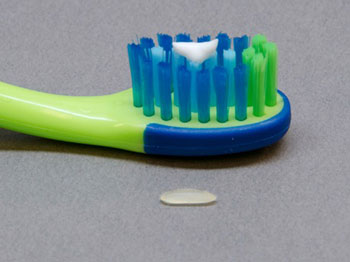
For children under three years old.
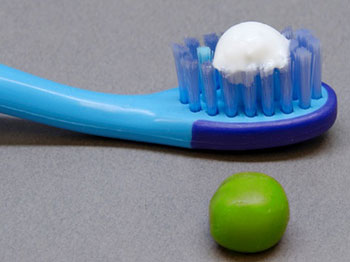
For children three to six years old.
When to Visit the Dentist
Your child's first dental visit should happen when their first tooth erupts and no later than their first birthday. This early visit is like a well-baby checkup for their teeth. The dentist can assess for any signs of decay, demonstrate proper brushing techniques, and provide guidance on maintaining a healthy oral care routine. Regular dental checkups are crucial for catching potential problems early and keeping your child's smile healthy.
Your dentist can also advise on fluoride intake. Fluoride helps prevent cavities by strengthening tooth enamel, so children need to get the right amount. Ask your dentist if your child receives sufficient fluoride through water or supplements.
Setting the Stage for a Lifetime of Healthy Smiles
Healthy baby teeth pave the way for healthy adult teeth. By establishing good oral care habits early, providing a nutritious diet, and scheduling regular dental visits, you can help your child maintain a bright, healthy smile that will last a lifetime. Remember, the habits your child learns now will impact their dental health as they grow.
Visit Our Office
Office Hours
- MON8:30 am - 5:00 pm
- TUE8:30 am - 5:00 pm
- WEDClosed
- THUClosed
- FRI8:30 am - 5:00 pm
- SAT9:00 am - 2:00 pm
- SUNClosed